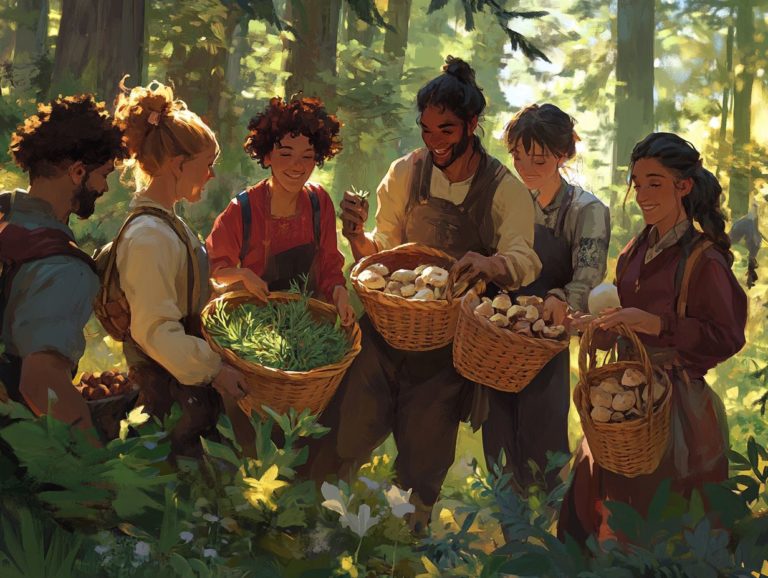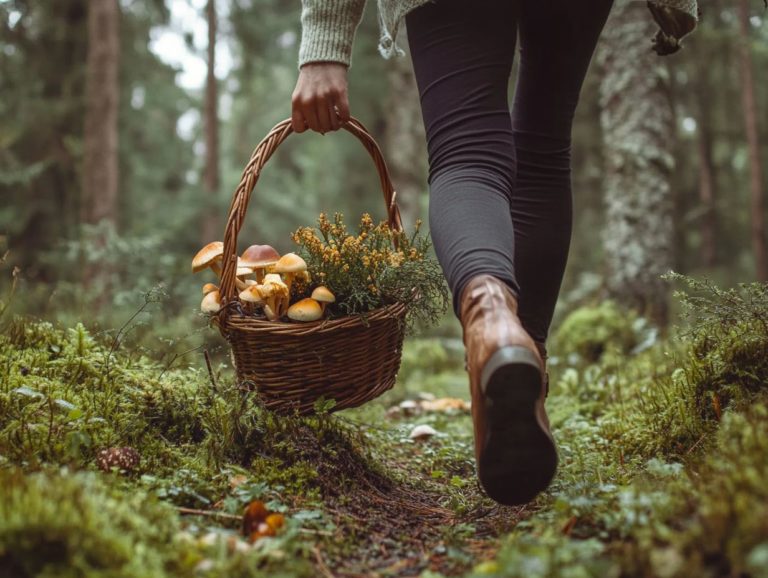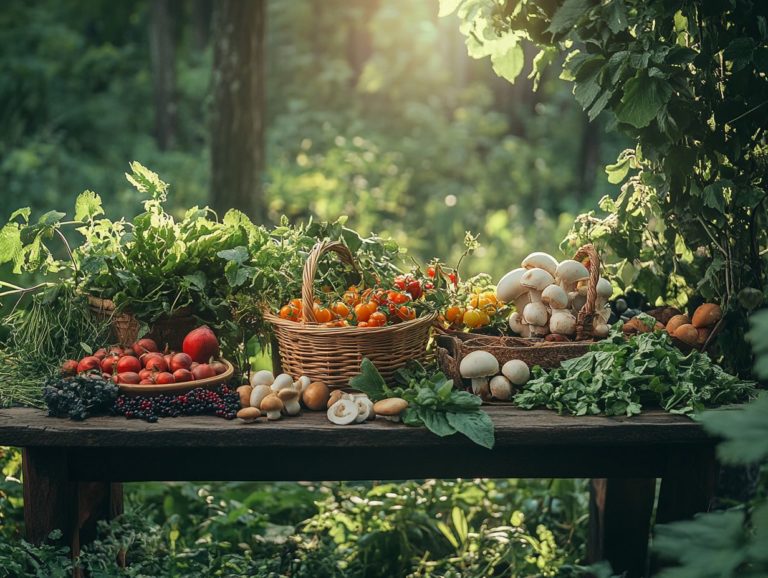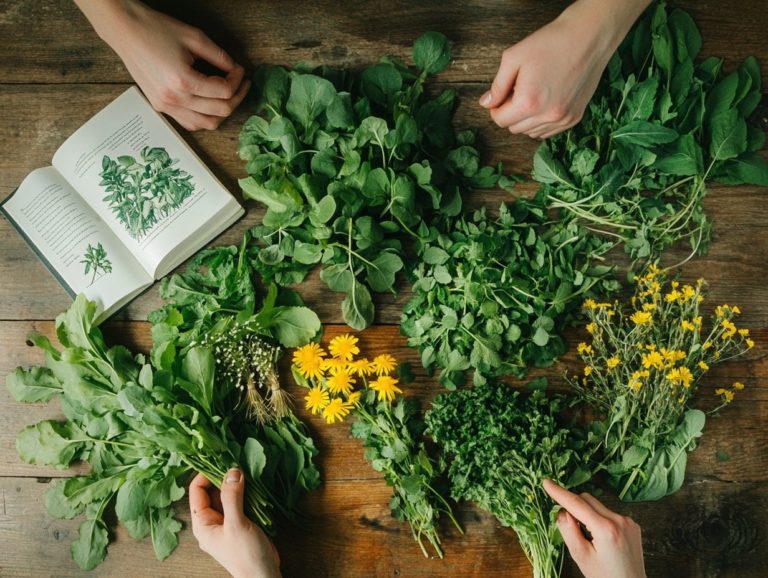How to Join Local Foraging Groups for Sustainability
Foraging has become increasingly popular as a sustainable method to connect with nature and enjoy fresh, local food.
Whether you re a seasoned forager or simply intrigued by the concept, joining local foraging groups can elevate your experience and enrich your knowledge.
This guide is designed to immerse you in the foraging community, covering everything from the basics to discovering events, connecting with experts, and even launching your own group.
Explore how you can contribute to sustainability while indulging in nature’s abundant offerings!
Contents
- Key Takeaways:
- 1. Understand the Concept of Foraging
- 2. Research Local Foraging Groups
- 3. Attend a Foraging Event or Workshop
- 4. Join Online Foraging Communities
- 5. Reach Out to Local Environmental Organizations
- 6. Attend Farmers Markets and Talk to Vendors
- 7. Join a Community Garden
- 8. Participate in Community Clean-Up Events
- 9. Connect with Local Food Co-ops
- 10. Volunteer with Conservation Organizations
- 11. Attend Local Sustainability Events
- 12. Join a Meetup Group for Foraging
- 13. Talk to Friends and Family
- 14. Participate in Social Media Discussions
- 15. Create Your Own Foraging Group
- Frequently Asked Questions
- What is the importance of joining local foraging groups for sustainability?
- How do I find and join local foraging groups?
- Do I need any special skills or knowledge to join a foraging group?
- What types of activities can I expect to participate in as a member of a foraging group?
- Are there any fees associated with joining local foraging groups?
- How can joining a local foraging group contribute to overall sustainability efforts?
Key Takeaways:
Here are some key takeaways to enhance your foraging journey!
- Educate yourself on the concept of foraging and its impact on sustainability.
- Utilize various resources, such as local events, online communities, and environmental organizations, to find and join local foraging groups.
- Engage in activities like attending workshops, joining community gardens, and participating in clean-up events to connect with other foragers and learn more about sustainable living.
1. Understand the Concept of Foraging
Foraging this art of seeking out and harvesting wild edible plants has evolved into a captivating lifestyle choice, especially in urban settings where you seek a deeper connection with nature and a boost to your food security.
This ancient practice promotes sustainability by encouraging the use of native plants while fostering a richer understanding of the ecosystem.
You ll encounter concepts like ethical foraging, which respects environmental concerns and considers the balance of invasive species in local habitats.
The First Peoples of various regions have long relied on foraging for survival and cultural expression, passing down invaluable wisdom that enriches your modern perspective on wild food.
In your urban foraging adventures, you might find yourself exploring parks, gardens, and even vacant lots, uncovering an impressive array of edible plants that showcase the versatility of urban spaces as sources of nourishment.
Wildcrafting means gathering wild plants for food and medicine, inviting you to discover the intersection of culinary delights and health benefits.
By adhering to ethical principles, you can ensure that your actions don t deplete local resources, helping to maintain the delicate balance within ecosystems.
Understanding the differences between native and invasive plants not only elevates the quality of your foraged goods but also plays a crucial role in protecting biodiversity.
Ultimately, embracing foraging empowers you and your community, providing fresh, affordable food options while nurturing a profound connection to the natural environment.
2. Research Local Foraging Groups
Researching local foraging groups is an essential step for anyone ready to dive into the fascinating world of wild food. You can also find out how to join a foraging workshop near you to enhance your experience.
These communities offer invaluable educational resources and networking opportunities that can enrich your foraging journey.
Among these remarkable organizations, Gather Victoria shines as a vibrant hub for urban foragers, actively engaging residents in rediscovering the edible plants flourishing right in their neighborhoods.
In California, groups like Foraging emphasize the thrill of gathering food and the importance of sustainable practices that protect local ecosystems.
These organizations frequently host workshops to teach you how to identify native species, understand seasonal availability, and implement responsible harvesting techniques.
By nurturing a culture of sustainability, they provide you with hands-on experiences while encouraging the establishment of community gardens.
This initiative enhances urban spaces and cultivates a deep sense of connection among local foragers.
3. Attend a Foraging Event or Workshop
Attending a foraging event or workshop can truly elevate your understanding of wild plants and their many uses. It provides invaluable hands-on experiences in plant identification and ethical foraging practices.
These workshops typically offer practical, engaging lessons on recognizing various plant species in their natural habitats. You will learn essential identification techniques for safe and informed foraging.
They emphasize sustainable harvesting methods, ensuring you understand the importance of preserving ecosystems while gathering wild edibles.
These events cultivate a sense of community among participants, allowing you to share a passion for nature, experiences, tips, and recipes. This collaborative learning atmosphere deepens your appreciation for the outdoors and fosters lasting connections with like-minded individuals.
4. Join Online Foraging Communities
Joining online foraging communities opens the door to a treasure trove of knowledge and support, whether you are just starting out or have years of experience. These spaces foster rich discussions, provide valuable resources, and offer expert advice on edible plants and methods of collecting wild plants.
These platforms are not merely repositories of information; they also emphasize critical safety guidelines, empowering you to forage with confidence and responsibility. By sharing personal experiences, you can gain insights from the triumphs and missteps of others, making your journey feel much less intimidating.
As you connect with fellow enthusiasts, you will find a genuine sense of belonging and camaraderie. Members exchange tips, organize group foraging excursions, and even host workshops. Immersing yourself in these communities elevates your foraging experience, blending education with social interaction.
5. Reach Out to Local Environmental Organizations
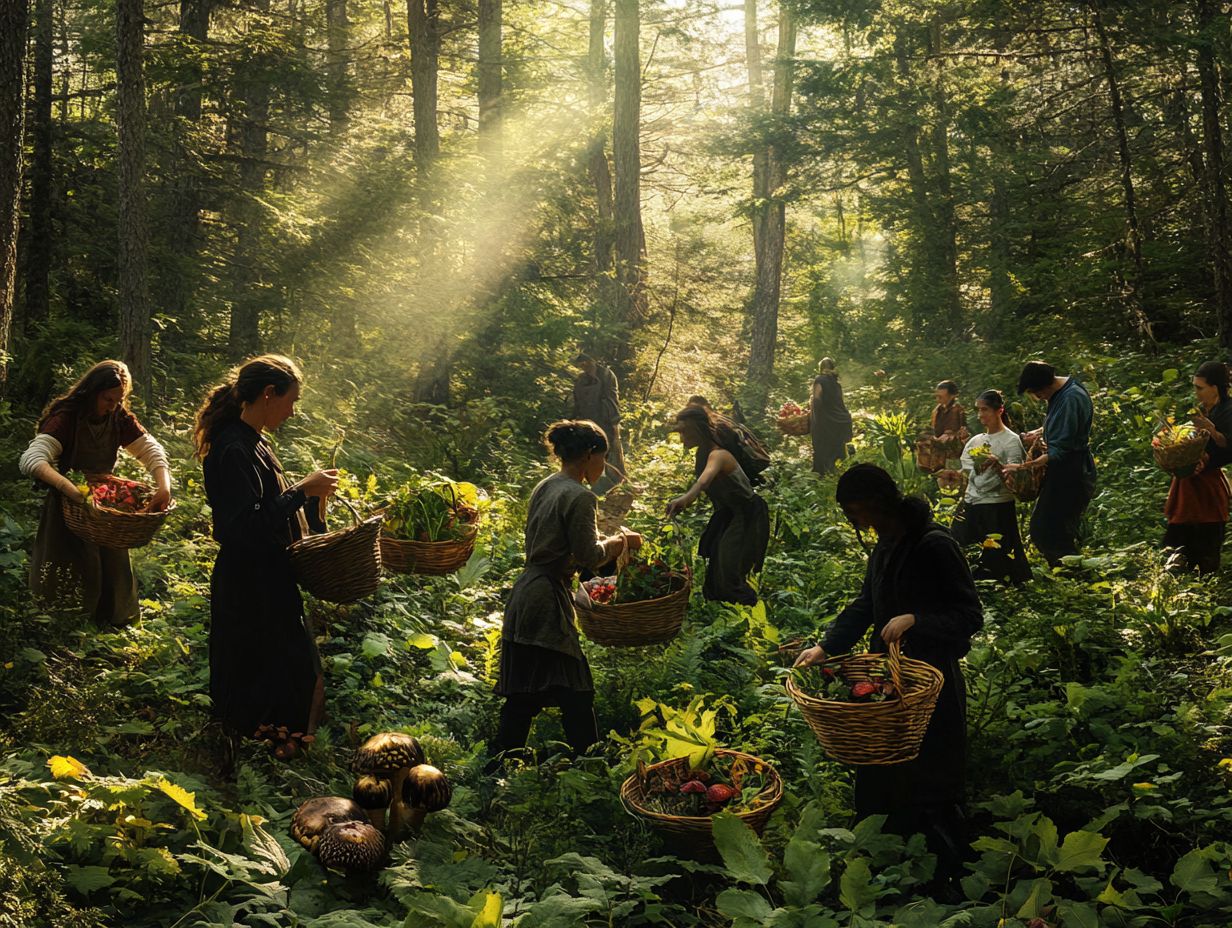
Reaching out to local environmental organizations can truly enhance your foraging journey. They connect you with invaluable resources dedicated to conservation, sustainable practices, and how to promote foraging in your community, celebrating the joys of wild food.
These organizations curate educational materials that enlighten the public about native plant species, their ecological benefits, and the critical importance of biodiversity. By organizing community events like workshops and guided foraging tours, they help cultivate a deeper understanding of local ecosystems.
They actively champion the preservation of native plants within community gardens and urban parks, ensuring these vital resources are safeguarded for future generations. Through their collaborative efforts, you can learn how to forage responsibly and contribute to the health of your environment.
6. Attend Farmers Markets and Talk to Vendors
Don’t miss out on farmers markets! They are an amazing way to connect with local vendors, discover the seasonal availability of wild food, and learn about sustainable harvesting practices.
These interactions provide invaluable insights into the edible plants that thrive in your region, allowing you to expand your culinary repertoire. Engaging in conversations with knowledgeable vendors can unveil unique tips on foraging techniques.
Seasonal wild foods are available only for a limited time, so act quickly to discover what’s fresh! Pairing purchases from the market with fresh, wild options can enhance both your meals and your understanding of the environment.
This harmonious blend of foraging and supporting local agriculture fosters a more diverse, sustainable approach to food sourcing. By integrating foraged finds with your farmers market treasures, you elevate your culinary experience while cultivating a sense of community and appreciation for local ecosystems. Join the conversation! Share your foraging stories and tips with others.
7. Join a Community Garden
Joining a community garden not only elevates your urban foraging experience but also enhances local food security while promoting the growth of native plants and biodiversity.
These spaces create meaningful connections among individuals. You will cultivate a sense of belonging with fellow foragers and local residents.
Sharing valuable knowledge, tips, and techniques that celebrate sustainable gardening allows you to form friendships rooted in a shared passion for the environment.
Community gardens often host workshops and events, transforming into vibrant educational hubs. Here, you can learn about the benefits of foraging responsibly and the importance of preserving local ecosystems.
This collaborative spirit empowers you while strengthening the community, ultimately fostering a greener, more resilient urban landscape.
8. Participate in Community Clean-Up Events
Participating in community clean-up events presents a meaningful opportunity to give back to your environment while addressing environmental problems like invasive species and honing your foraging skills.
By actively engaging in these initiatives, you contribute to restoring natural areas, fostering healthier ecosystems where native plants and wild food sources can thrive.
This hands-on experience deepens your appreciation for local flora and highlights the intricate connections between conservation efforts and sustainable foraging practices.
Removing harmful species helps create a resurgence of beneficial plants. This educational opportunity allows you to learn the ethical aspects of foraging essential knowledge that emphasizes the importance of balancing nature’s bounty with responsible stewardship.
9. Connect with Local Food Co-ops
Connecting with local food co-ops offers a remarkable opportunity to explore the synergy between foraging and sustainable agriculture, supporting community-based food systems and local farmers.
These co-ops provide invaluable resources and workshops that immerse you in the art of foraging, empowering you with knowledge about edible plants and safe harvesting techniques.
By collaborating with community gardens and engaging in various sustainable initiatives, you can deepen your understanding of how wild foods enhance your diet and promote biodiversity.
Such involvement cultivates a connection to local ecosystems while fostering shared experiences among participants, strengthening community ties and championing environmental stewardship and local sustainability efforts.
10. Volunteer with Conservation Organizations
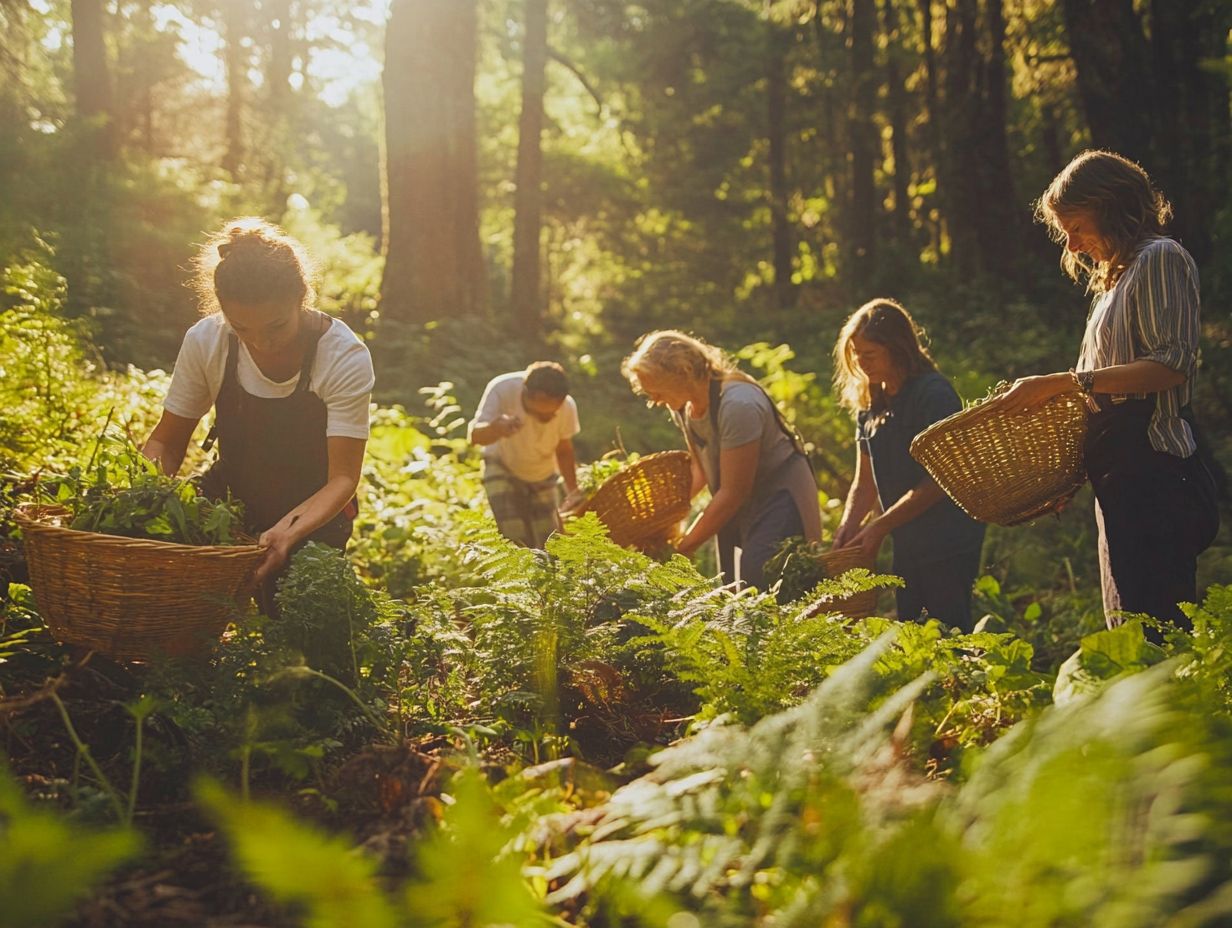
Volunteering with conservation organizations offers you a unique opportunity to deepen your understanding of local ecosystems. You’ll gain hands-on experiences that enhance your foraging skills while tackling critical environmental issues head-on.
When you engage in restoration projects, you re breathing new life into native habitats and learning to identify and cultivate local plants essential to the ecosystem.
This immersive experience cultivates a profound appreciation for the delicate balance of nature and underscores the significance of sustainable foraging practices.
Discover valuable insights that empower you to make informed choices that positively affect local biodiversity. Ultimately, this volunteer work nurtures your personal growth while fortifying community resilience and fostering a spirit of environmental stewardship.
11. Attend Local Sustainability Events
Attending local sustainability events provides you with great learning opportunities about foraging, wild food, and how to use local resources for sustainable foraging, all while cultivating meaningful community connections.
You will also find yourself immersed in practical classes where you can learn to identify edible plants, along with engaging talks from experienced foragers who share their insights and tips. These gatherings create an enriching environment for learners of all levels, making it easy to dive in.
You’ll encounter a variety of sessions covering essential topics like soil health, seed saving, and a way of gardening that works with nature. These events become a comprehensive hub for anyone eager to explore urban gardening. Plus, you will find a wealth of resources, including informative pamphlets and local foraging maps, supporting your journey into sustainable living.
12. Join a Meetup Group for Foraging
Joining a Meetup group dedicated to foraging offers exceptional opportunities to connect with individuals who share your passion while honing your skills in identifying and harvesting wild foods. You can also explore how to set up foraging community events to further engage with fellow enthusiasts.
These groups often organize foraging outings that create a vibrant atmosphere for shared experiences, allowing you to learn from fellow members in a practical setting. By engaging in discussions and workshops, you can explore the intricacies of various plant species, uncovering insights that books simply can’t provide.
Responsible foraging takes center stage, as experienced foragers share their expertise on sustainable harvesting methods, ensuring that nature’s bounty remains accessible for generations. Through these meaningful interactions, you’ll cultivate a sense of community and deepen your respect for the environment.
13. Talk to Friends and Family
Join the adventure of foraging by engaging in conversations with friends and family. It can ignite a shared passion and foster collaboration, leading to memorable experiences and exciting adventures in the realm of wild food.
These discussions often spark community gardening projects, where local residents unite to cultivate edible plants and create thriving, sustainable green spaces. Planning family foraging trips offers a chance to explore nature’s beauty and strengthens your connection to the environment.
Sharing insights about local edible plants encourages responsible foraging, ensuring that everyone appreciates the significance of preserving natural resources. As you exchange tips and experiences, a supportive network emerges, enriching everyone s understanding of nature s generous offerings.
14. Participate in Social Media Discussions
Engaging in social media discussions about foraging can offer you valuable insights and help cultivate a vibrant community of like-minded individuals passionate about wild food and sustainable practices.
Platforms such as Facebook and Reddit are filled with dedicated groups where you can share your journeys and discoveries. In these spaces, enthusiasts exchange essential safety guidelines to ensure responsible foraging. The conversations often feature tips for identifying a variety of plants and mushrooms, making the knowledge accessible even to those just starting out.
Threads filled with personal experiences weave a rich tapestry of information that empowers you to explore the wild responsibly. Whether through stunning photos or captivating anecdotes, participants deepen their understanding of nature while connecting with others who appreciate the beauty of the outdoors.
Don t miss out on the chance to connect with nature! Get involved today!
15. Create Your Own Foraging Group
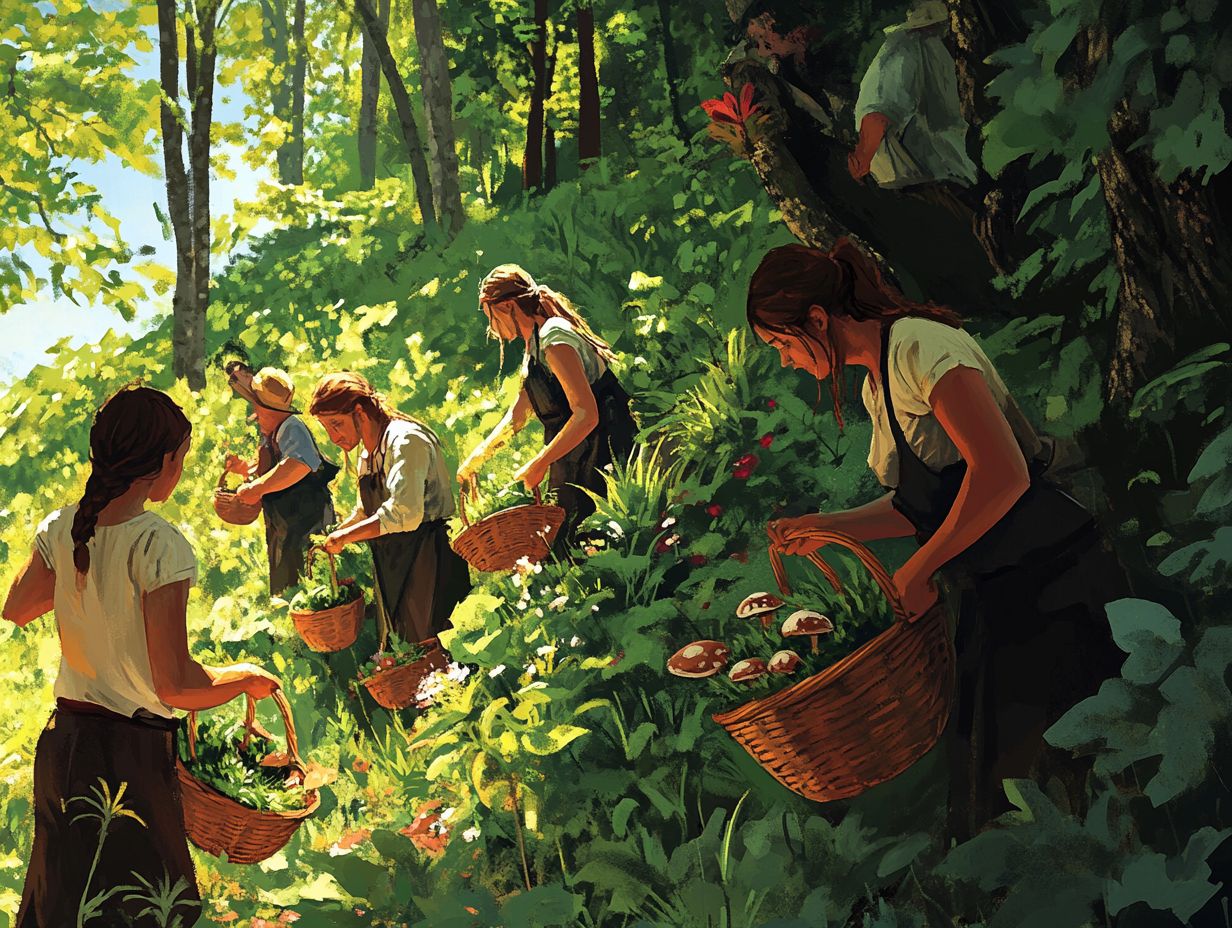
Creating your own foraging group allows you to share knowledge, build relationships, and foster a shared love for wild food within your community. You can also participate in local foraging challenges to enhance your experience.
By bringing together like-minded individuals, you join an exciting journey that deepens your understanding of local plants and cultivates friendships grounded in shared passions. Start this process by organizing events think group foraging days or educational workshops where participants can learn the essentials of plant identification.
Establishing a network for sharing resources can be incredibly beneficial. Consider creating a dedicated platform where members can exchange tips and showcase their foraging finds. If you’re interested in taking this further, learn how to organize a community foraging event. As your group evolves, it’s essential to prioritize ethical foraging practices and embrace sustainability, ensuring that wild edibles remain abundant for generations to come.
Watch this video to learn more about foraging techniques and tips!
Frequently Asked Questions
What is the importance of joining local foraging groups for sustainability?
Joining local foraging groups fosters community, shares knowledge, and promotes sustainable food practices. If you’re interested in forming your own group, check out these tips for starting your own foraging group.
How do I find and join local foraging groups?
You can find and join local foraging groups by searching online, reaching out to local environmental organizations, attending community events, and exploring how to organize a local foraging event through social media groups focused on foraging.
Do I need any special skills or knowledge to join a foraging group?
No, you do not need any special skills or prior knowledge. Group members often have varying levels of experience and are eager to share their expertise.
What types of activities can I expect to participate in as a member of a foraging group?
As a member, you can participate in group foraging trips, educational workshops, seed and plant exchanges, and community gardening projects.
Are there any fees associated with joining local foraging groups?
Some groups may charge a small membership fee to cover expenses, but many operate on a volunteer basis and do not require fees. Always check with the specific group for details.
How can joining a local foraging group contribute to overall sustainability efforts?
Joining a local foraging group helps contribute to sustainability by learning sustainable foraging techniques, supporting local food systems, and reducing your environmental impact. You can also discover how to use Meetup for local foraging events to connect with like-minded individuals.
Start your own foraging group today and connect with nature in an exciting way!

